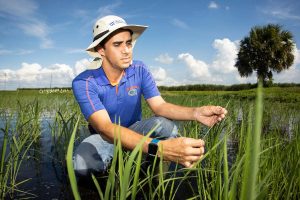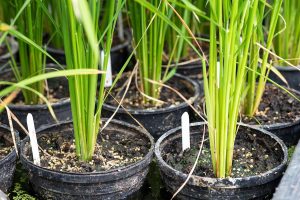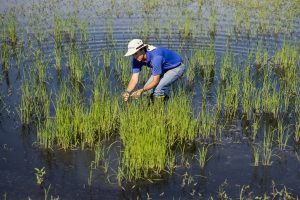
Rice, the vital crop enjoyed by more than half the world’s population, boasts a versatility that’s hard to match. Across continents, many countries and cultures make the grain their own center of the plate, a side and even incorporate it as an ingredient in desserts.
Rice cultivation in Florida has a small but growing place in the market as it is primarily concentrated in and around the Everglades Agricultural Area (EAA), mainly in Palm Beach County. As of 2023, about 24,000 acres of rice grow in Florida.
“This acreage has been fairly consistent the past five years,” said Matthew VanWeelden, UF/IFAS Extension Palm Beach County agronomic crops agent. “In terms of total U.S. production, Florida accounts for only about 1% of the acreage. There is potential for growth.”
The top three rice-producing states are Arkansas, with about 1.4 million acres; California, with approximately 508,000 acres and Louisiana, which produces about 480,000 acres.
While Florida’s rice production is relatively small compared to the rest of the United States, its cultivation offers significant benefits to the environment and the sugarcane fields of the EAA. These benefits include reductions in soil subsidence, improved pest management, water conservation, wildlife habitat, enhanced fertilizer efficiency and increased organic amendments from rice stubble.
To highlight the unique attributes of growing rice in Florida, UF/IFAS will host a free Rice Field Day on August 8 at the UF/IFAS Everglades Research and Education Center (UF/IFAS EREC). The workshop aims to educate new and existing growers as well as faculty with updated research. Continuing Education Credits will be available. Advance registration is required by August 6.
“Given our relatively small rice industry compared to other states, we invite anyone interested in learning about Florida rice,” said VanWeelden.

Event Details:
Time: 8:15 a.m. to 2 p.m.
Location: UF/IFAS EREC, 3200 East Palm Beach Rd., Belle Glade
Cost: Free with lunch sponsored Florida Rice Growers Inc.
Advance registration required by August 6: Pleaser register here for the workshop.
Here is the day’s itinerary.
8:15 a.m. Registration
8:30 a.m. Welcome and announcements

8:45 a.m. Travel to field stop #l
9:10 a.m. Benefits of flooded rice cultivation in the EAA, Jehangir Bhadha
9:40 a.m. Update on Florida rice variety program, Matthew Vanweelden
10:20 a.m. Overview and management of arthropod pests in rice, Julien Beuzelin, De-Fen Mou, Matthew VanWeelden
11:00 a.m. Travel to field stop #2
11:25 a.m. Weed management in rice, Calvin Odero
11:55 a.m. Return to conference center for indoor sessions and break
Noon Lunch (Sponsored by Florida Rice Growers Inc.)
12:45 p.m. Planthoppers in Florida rice, De-Fen Mou
1:00 p.m. Florida rice variety program 2023 results, Matthew VanWeelden
1:30 p.m. Discussion and closing remarks
###
ABOUT UF/IFAS
The mission of the University of Florida Institute of Food and Agricultural Sciences (UF/IFAS) is to develop knowledge relevant to agricultural, human and natural resources and to make that knowledge available to sustain and enhance the quality of human life. With more than a dozen research facilities, 67 county Extension offices, and award-winning students and faculty in the UF College of Agricultural and Life Sciences, UF/IFAS brings science-based solutions to the state’s agricultural and natural resources industries, and all Florida residents.
WHY FOOD IS OUR MIDDLE NAME
Feeding a hungry world takes effort. Nearly everything we do comes back to food: from growing it and getting it to consumers, to conserving natural resources and supporting agricultural efforts. Explore all the reasons why at ifas.ufl.edu/food or follow #FoodIsOurMiddleName.
 0
0
